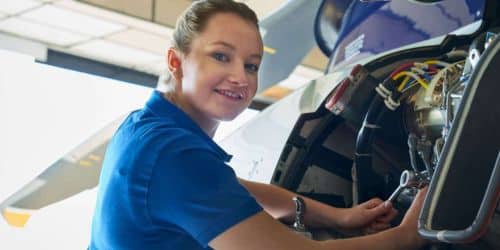An aerospace engineer is responsible for the development and evaluation of aircraft and spacecraft prototypes. Aerospace engineering is a highly technical sector with rewarding salaries, perks, and careers. Read on to know more about the job description of an aerospace engineer, its salary, and what they do. Let’s dive in!
Who Is an Aerospace Engineer?
An aerospace engineer is an accredited engineer who works in the aerospace or space industries on projects like airplane and spaceship design and testing. They have rigorous quality controls in place to guarantee the security of all space and air passengers. Being an aerospace engineer is a demanding profession that calls for exceptional knowledge and skills.
Types of Aerospace Engineers
The following are the types of aerospace engineers:
#1. Aeronautical Engineers
Aeronautical engineers research the aerodynamic performance of aircraft, taking into account their design, materials, and propulsion system. These experts also design, develop, manufacture, and maintain aeronautical systems and components for use by the military, the airline industry, and the general public. Routine inspections are performed in addition to producing aircraft and aeronautical equipment and systems that are dependable, safe, and efficient.
Cost-effective strategies for enhancing fuel efficiency and flight safety are developed by the aeronautical engineer. They are committed to developing airplanes that minimize damage to the natural world caused by air travel. A commercial airline may employ an aeronautical engineer to find ways to reduce fuel consumption without sacrificing speed or aerodynamics.
#2. Astronautical Engineers
Engineers specializing in astronautics work to improve the technology and performance of spacecraft through design, development, testing, and refinement. Thermodynamics, aerodynamics, astronomical mechanics, celestial mechanics, propulsion, guidance systems, and flight mechanics are all studied by these engineers using spacecraft. Most astronautical engineers are employed by companies that produce or work for government space programs.
Regular inspections to find issues and defective products, coming up with appropriate solutions, developing quality control standards, and maintaining documentation of processes and performance are all part of their job description, in addition to designing and manufacturing spacecraft and related equipment and systems.
Engineers in the field of astronautics work on a variety of spacecraft, including navigational aids, probes, satellites, rockets, missiles, and space launchers. A government entity employing an astronautical engineer might commission the creation of a spacecraft specifically for Mars exploration.
What Does an Aerospace Engineer Do?
Advanced technologies for transportation, communications, exploration, and defense are developed by aerospace engineers, who also incorporate these technologies into the systems of aeronautical vehicles. Aircraft, spacecraft, propulsion systems, satellites, and missiles are just some of the goods, components, and subassemblies that fall under this category.
Aerodynamics, materials and constructions, propulsion, vehicle dynamics and control, and software are all crucial areas of expertise for aerospace engineers.
Where Does An Aerospace Engineer Works?
Most aerospace engineers work in the aerospace industry or for one of its many suppliers, including systems and software developers, private companies, the government, and academic institutions. Because of their extensive training and expertise as systems architects and engineers, aerospace engineers are able to make significant contributions in a wide variety of fields. The following are the places where an aerospace works:
- Airlines
- Research and development organizations
- Contract agencies
- Consulting firms
- The military
- Government agencies
- Colleges and universities
- Systems and software suppliers
Aerospace Engineer Job Description
The following is the job description of an aerospace engineer:
- An undergraduate degree in aerospace engineering, engineering, or a closely related discipline is required, with a graduate degree in aeronautical engineering being highly desired.
- A background of five (5) years as an aeronautical engineer
- Possessing a Professional Engineer (PE) certification is an advantage, as is the ability to develop and build models and simulations using cutting-edge computer software.
- An inspired thinker who excels in high-pressure situations
- capable of dissecting issues and developing viable plans of action
- Excellent ability to express oneself both orally and in writing
- Familiarity with the fundamentals of aerospace engineering
- A participant who thrives in an environment where they are encouraged to try new things
- Able to perform complex mathematical analysis for the purposes of design and problem-solving
- Superb ability to analyze situations and manage time
- Extremely methodical and detail-oriented
- Problem-solving abilities that allow you to isolate issues, track out their origins, and try out potential fixes
Duties and Responsibilities
The following are the duties and responsibilities of an aerospace engineer:
- investigating the causes of air accidents
- Create, examine, try out, and fix various aerospace technologies
- Develop and improve cutting-edge products and procedures.
- Manage production to make sure goods are made properly.
- Find production issues with products and procedures
- Solve problems at their source to improve products and procedures.
- Develop product and procedure enhancement quality standards
- Create new ideas and enhance existing designs by conducting research in their field of expertise.
- Work in tandem with other departments of the aerospace industry
- To prepare them for the industry, train and coach younger aeronautical engineering employees.
- planning installation and maintenance schedules
- resolving problems that arise during design, installation, and maintenance
- analyzing and interpreting data
- providing technical advice and writing reports.
- assessing design requirements
- agreeing budgets, timescales, and specifications with clients and managers
- designing, testing, and implementing parts, systems, and procedures
- undertaking theoretical and practical research – for example, into fuel efficiency
Aerospace Engineer Job Description Template
An accomplished and committed aeronautical engineer is wanted by our company. The aerospace engineer’s duties will include coming up with designs for new aircraft, aerospace components, and satellites, as well as testing, manufacturing, and deploying them. The ideal candidate will be a technically proficient problem-solver who is excited to put their scientific and mathematical skills to use in the creation and solution of air and space ideas. The aerospace engineer’s duties will include determining the cause of aircraft problems, examining the aircraft’s structure for signs of damage or future problems, and developing test models.
How To Become an Aerospace Engineer
The following are the steps to take to become an aerospace engineer:
#1. Take Advanced Math and Science Classes in High School
You can better your chances of landing a job as an aerospace engineer if you major in advanced mathematics and science topics like calculus, physics, and chemistry. If you do well in these courses, you may increase your college acceptance chances.
You may need to take some adult education courses after graduating from high school if you want to switch careers without having to repeat any of your education. Sponsorship from your existing employer can be a great asset in climbing the corporate ladder. If you want to know what options you have, you can inquire with upper management or HR.
#2. Pick Out Some Fun Things to Do in Your Spare Time
Participate in outside interests and pursuits that have some connection to aerospace. The correct pursuits can help you learn how to think critically, solve problems, and broaden your scientific horizons. Think about engineering, problem-solving games, computer programming, and puzzle-solving. Join engineering-related groups and go to engineering-themed summer camps if you can.
#3. Complete a Four-Year Degree Program in Aerospace Engineering
A bachelor’s degree in aerospace engineering is typically required by businesses. The Accreditation Board for Engineering and Technology (ABET) recognizes this four-year degree as meeting the standards for excellence in engineering and technology education. Some schools provide part-time study options for working adults. You may be able to enter the field of engineering with fewer academic requirements if you already have substantial work experience in the field. Talk to your employer about what you can do.
#4. Choose a Suitable Minor
Choose a minor that will help you get hired. Taking additional classes to fill in knowledge gaps is also recommended. Since many jobs in today’s economy require some level of report writing and familiarity with standard business procedures, having strong writing and business acumen will set you apart from the competition.
#5. Complete an Internship or Co-operative Program
Interning for an aerospace firm is helpful in building experience and networking, but it’s not required. Think about getting some job experience in the aircraft business through an internship. In order to provide students with practical experience, several universities form partnerships with local businesses. If you are currently employed, you may want to ask to shadow an engineer for a day so you can get a feel for what they do.
#6. Complete Post-graduate Study in Aerospace Engineering
A graduate degree isn’t required for most jobs, but it can increase your chances of getting hired. Some universities allow students to complete both a bachelor’s and master’s degree in five years. If you already have a bachelor’s degree in a related field like physics, you may be able to transfer into a master’s program in aeronautical engineering.
#7. Apply to Entry-Level Positions and Apprenticeships
Get some experience under your belt by applying for entry-level jobs and internships. Think about submitting your resume to your former internship or co-op employer. Aerospace companies and government agencies on a national and regional scale should also be considered. You need to be a citizen or permanent resident of the United States to work for a government organization like NASA. You require a security clearance to work in defense, including on private sector contracts related to defense.
#8. Earn a Living in a Relevant Field
If you’re having trouble finding employment in engineering, you might want to look into alternative options. Aerospace engineering is a competitive field, and it may take time before you find a job. However, working as an aeronautical technician or in a similar field might help you get valuable experience and connections. You might be qualified for an aircraft engineering post after gaining relevant work experience for several years.
#9. Participate in a Professional Group
You should think about becoming a member of a professional organization in this area. For example, joining the American Institute of Aeronautics and Astronautics opens the door to a wealth of learning and networking possibilities.
#10. Obtain a Valid License
Earning a state license isn’t mandatory for entry-level work, but it will help you get ahead in your engineering career. A degree in engineering from an ABET-accredited institution, a passing score on the Fundamentals of Engineering exam, and a passing score on the Professional Engineering exam are normally necessary to practice engineering in most states. You’ll also want to have some experience in the field. The industry standard is four years.
Skills for an Aerospace Engineer
Due to the interdisciplinary nature of the workplace, it is imperative that aerospace engineers have a firm grasp of the connections between aeronautical engineering and other branches of engineering. Language proficiency is helpful, and the ability to operate in a team is essential, because of the prevalence of international collaboration. The following are the skills you need to acquire as an aerospace engineer:
- superior abilities in quantitative analysis and problem-solving
- technological know-how, including proficiency with computer-aided design software
- imagination and originality
- focus on specifics
- the consciousness of the importance of safety
- ability to express oneself verbally and in writing
- time management and project administration
- a determination to learn new technologies as they emerge
- skill in maintaining productivity while facing time constraints
- skill in collaborating across disciplinary boundaries.
Salary of Aerospace Engineer
The average salary for an aerospace engineer who focuses on aircraft is $78,477. These results are based on 1,013 salary reports that were submitted to Indeed by employees, users, and current and former job adverts within the last 36 months. A candidate’s average tenure within an organization is between one and three years.
Qualifications of an Experienced Aerospace Engineer
Before starting a new employment, an aspiring engineer needs to become an EIT (engineer in training). Candidates for entry-level Aerospace Engineer positions who have earned a bachelor’s degree are eligible to take the Fundamentals of Engineering (FE) exam. After they have accrued the necessary work experience as specified by your organization, they will be eligible to take the Principles and Practice of Engineering exam. State licensure requires passing the FE and PE tests, four years of relevant work experience, and a degree from an ABET-accredited program.
Do Aerospace Engineers Make Money?
As a bonus to having a rewarding job, an aerospace engineer also receives a salary that ranks among the highest in the nation. Aerospace engineers earn a median annual salary of $101,447 in the United States. They have a wide range of career options with varying levels of financial reward.
Is Aerospace Engineer a Stressful Job?
Engineers in the aerospace industry typically work in offices surrounded by others in the field who specialize in the design and construction of airplanes, spaceships, weapons, and related parts. Aerospace engineers often operate in a low-stress atmosphere, however, they may feel time constraints due to project deadlines.
Is It Hard To Get a Job as an Aerospace Engineer?
Aerospace engineering is a competitive field, therefore you might not get a job right away. However, working as an aerospace engineer, for example, can help you gain valuable expertise and connections in the field. You might be able to get a job in aeronautical engineering after a few years of experience.
Final Thoughts
Aerospace engineers employ advanced computing systems and software to model, create, assess, and simulate components, goods, and vehicles to determine the viability of ideas from a financial and safety standpoint, as well as to ensure compliance with applicable regulations. Large-scale projects that need teamwork are discussed amongst themselves, and numerous engineers work together to get everything done. Becoming an Aerospace engineer is really a great choice. t is a very lucrative job and also a very high-paying job. We do hope this article helps you navigate your way into the Aerospace engineering world.
Related Articles
- The Top 10 Industries That Rely on Sheet Metal
- Demand Planning Softwares: Top 2023 Picks & Best Practices
- WHO IS A DATA ENGINEER? Skills Requirement And 2023 Salary
- STAFF SOFTWARE ENGINEER: What is it, Duties, Salary & How to Become One
- SOFTWARE ENGINEER: Meaning, Duties, Salary, How to Become One & Tips
- WHAT DOES A PAINTER DO: Job Description and Responsibilities






